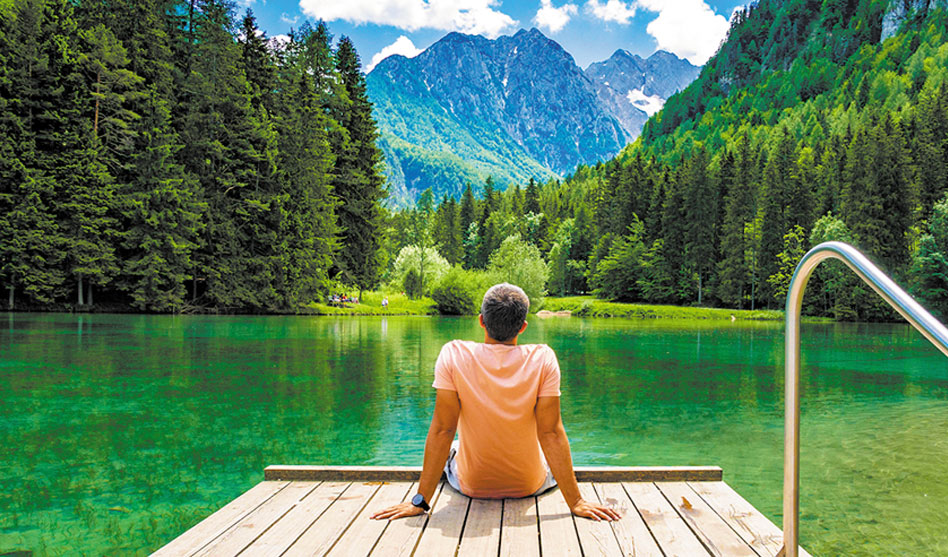As the politics of hate grip our country, we have to find ways to find peace
 Urban environments contain countless noises that would disrupt our inner lives if we did not filter them out: the beeping of a delivery truck backing up; the siren of an emergency vehicle; impatient drivers blasting their horns as if surprised to encounter traffic while driving downtown.
Urban environments contain countless noises that would disrupt our inner lives if we did not filter them out: the beeping of a delivery truck backing up; the siren of an emergency vehicle; impatient drivers blasting their horns as if surprised to encounter traffic while driving downtown.
I find detachment in various ways — from turning my phone ringer off, to listening to music, to sitting on my roof deck gazing at the moon. Often, when I am there with a glass of wine in the evening, cheers rise up from a nearby soccer field.
At home in the city, we still need moments of solitude. Some afternoons I spend in a garden owned by the nonprofit Resources for the Future on a quiet street across from First Baptist Church. In the mornings I like to sit in the park at Dupont Circle. These green spaces provide respite from the 24/7 news updates on the latest volleys in the GOP’s politics of rage.
Autumn is in the air now as I walk to the Circle with my morning coffee. Even here, though, there are reminders of the world’s tumult. To the north, across the lanes of traffic, stands the Dupont Circle Hotel, where former Putin media czar Mikhail Lesin was found bludgeoned to death in November 2015.
Luckily I have never been bludgeoned, but I was threatened in 2009 after writing a column titled “Pro-Gay, Pro-Choice” in response to the murder of Dr. George Tiller in his church in Wichita by an anti-abortion fanatic. The man threatening me by email called me an abortionist and said, “The only good abortionist is a dead abortionist.”
I contacted the FBI. He was later convicted of making threats against James Zogby of the Arab American Institute.
On the evening after Dr. Tiller was killed, a candlelight vigil was held beside the Dupont Circle fountain. Mourning is part of what binds us.
Most people making violent threats are just venting, but some few will act on them. And the leading Republican presidential candidate for 2024 has a penchant for inciting violence.
As I sit in the park, a squirrel climbs up my leg looking for a handout then scampers off. A few minutes later, a tiny spider crawls on my knee; I gently blow it onto the grass.
Some spiders migrate by clinging to gossamer carried on air currents. I wonder what it would be like to live that way and not be tied down by belongings.
I know several LGBTQ refugees in Nairobi who have next to nothing; but they had to flee for their lives, mostly from Uganda. I send a photo of the park bathed in the morning light to a few of them. Some have been resettled, but many are still waiting. It is humbling to think that despite cruelty and hate running rampant here, so many are still eager to come to this country.
As acclimatized to humans as the park’s wild creatures are, I suspect they would manage without us. Indeed, they might do better if we disappeared and stopped heating up the planet. Years ago I read a book called The World Without Us that considers what would happen if we were wiped out by, say, a virus that left our infrastructure intact. Nature would slowly overtake the ruins.
We are imperiled by a politics of aggressive ignorance. Demanding control without understanding courts catastrophe. Part of the strength of diversity is that it brings different perspectives to our shared challenges. If we treat it as a weakness, we may learn too late that we have only sabotaged ourselves.
To lessen my burden of possessions, this year I donated several cartloads of books to a local library for its occasional book sales. After decades of accumulating them, it was time to share. I still have plenty, but not on every surface.
The top of my rolltop desk has three musical instruments decorating it instead of the previous row of books, which included a three-volume boxed Shakespeare set too massive to be practical. Now I use a Kindle edition on my smartphone and tablet that allows quick searches.
The ways we connect change over time. The online world allows faster connections without an editor’s mediation. This facilitates greater participation but also accelerates the spread of poison. Noise drowns out thought. Rancor banishes solutions. Contempt blinds and deafens us.
To center ourselves and regain perspective requires seeking out places that help restore our peace of mind. Then we can more fully connect, inspired by our better angels.
Richard J. Rosendall is a writer and activist at rrosendall@me.com. Copyright © 2023 by Richard J. Rosendall. All rights reserved.
















